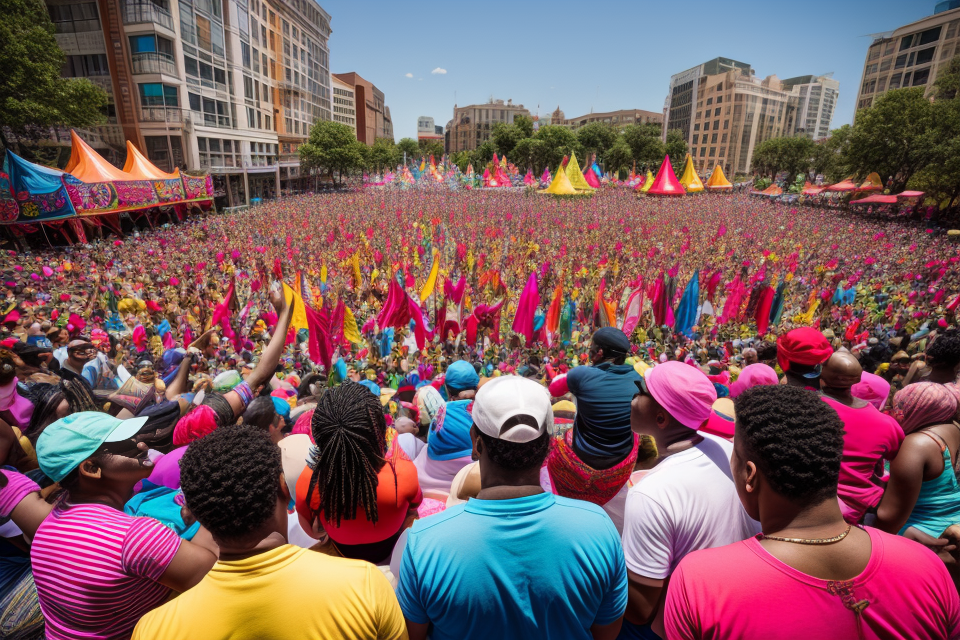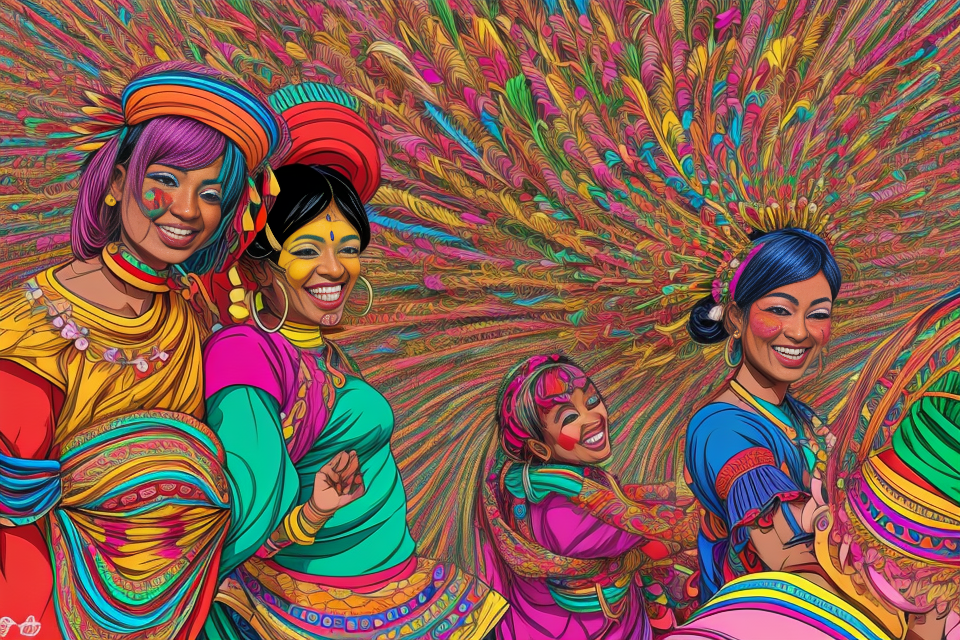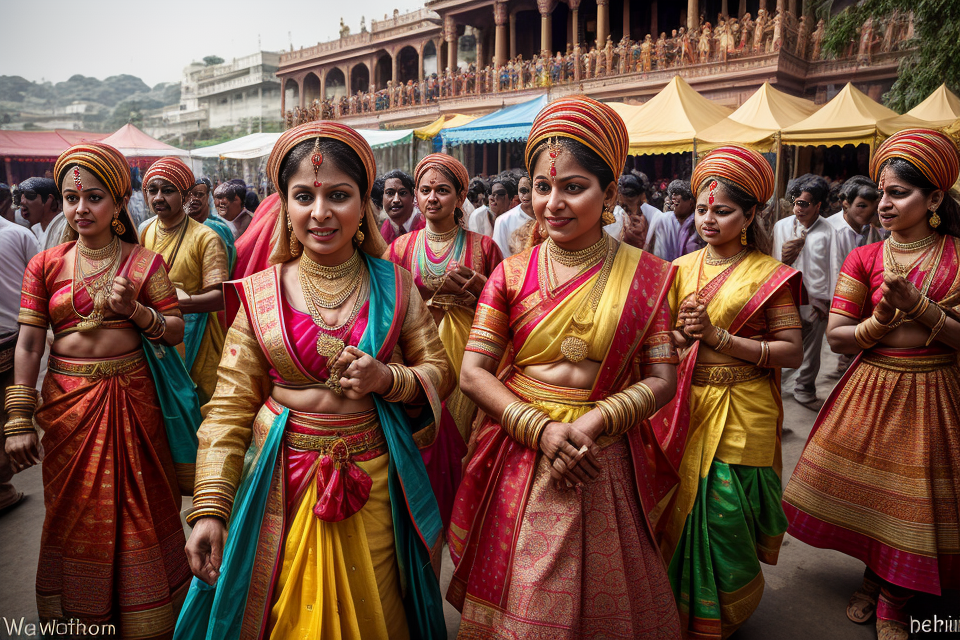Cultural festivals are events that celebrate the diversity of different cultures, traditions, and customs. These festivals aim to promote understanding, appreciation, and respect for different cultures and to encourage people to embrace and celebrate their own cultural heritage. Cultural festivals often feature music, dance, food, and other traditional practices that are unique to a particular culture. They provide an opportunity for people to learn about and experience different cultures, to foster cultural exchange, and to create a sense of community and belonging. The purpose of cultural festivals is to celebrate and appreciate the richness and diversity of human culture, and to promote greater understanding and respect among people of different backgrounds.
Understanding Cultural Festivals
Definition of Cultural Festivals
Cultural festivals are events that celebrate and showcase the diverse cultural practices, traditions, and heritage of different communities. These festivals provide a platform for people to come together and learn about different cultures, promote cross-cultural understanding, and foster a sense of community pride. Cultural festivals often feature traditional foods, music, dance, art, and other cultural expressions that reflect the unique customs and traditions of the participating communities.
In addition to promoting cultural awareness and appreciation, cultural festivals also serve as a means of preserving and promoting cultural heritage. By celebrating cultural traditions and practices, cultural festivals help to keep cultural heritage alive and encourage the transmission of cultural knowledge and values from one generation to the next. Furthermore, cultural festivals provide an opportunity for communities to celebrate their cultural identity and promote a sense of cultural pride, which can help to strengthen community bonds and promote social cohesion.
Overall, the purpose of cultural festivals is to celebrate and promote cultural diversity, foster cross-cultural understanding, and preserve and promote cultural heritage. Through these festivals, communities can come together to learn about and appreciate different cultures, promote cultural pride, and celebrate the rich diversity of human culture.
Importance of Cultural Festivals
Cultural festivals play a crucial role in promoting cultural exchange and understanding among different communities. They provide a platform for people to learn about and appreciate different cultures, while also helping to preserve and promote cultural heritage.
One of the primary purposes of cultural festivals is to foster a greater understanding and appreciation of different cultures. By bringing together people from diverse backgrounds, cultural festivals provide an opportunity for individuals to learn about and experience different customs, traditions, and practices. This can help to break down stereotypes and promote cross-cultural understanding, which is essential in today’s increasingly globalized world.
Another important aspect of cultural festivals is their role in preserving and promoting cultural heritage. Many cultural festivals focus on showcasing traditional music, dance, art, and crafts, providing a platform for artists and artisans to share their work with a wider audience. This not only helps to preserve traditional arts and crafts, but also promotes them to a wider audience, helping to ensure their continued survival.
In addition to promoting cultural exchange and preserving cultural heritage, cultural festivals also serve as a means of promoting social cohesion and community building. By bringing people together from different backgrounds, cultural festivals provide an opportunity for individuals to form new connections and build relationships with people from different cultures. This can help to foster a sense of community and belonging, which is essential for building strong, inclusive societies.
Overall, the importance of cultural festivals cannot be overstated. They provide a unique opportunity for individuals to learn about and appreciate different cultures, while also promoting cross-cultural understanding, preserving cultural heritage, and building social cohesion. By celebrating diversity through cultural festivals, we can help to create more inclusive and vibrant communities that value and embrace the rich cultural tapestry of our world.
The Purpose of Cultural Festivals
Promoting Cultural Diversity
- Cultural festivals are events that aim to celebrate and promote the diversity of different cultures.
- These festivals provide a platform for people from different cultural backgrounds to come together and share their traditions, customs, and beliefs.
- The primary goal of cultural festivals is to promote cultural diversity and to foster understanding and appreciation of different cultures.
- By showcasing the unique aspects of different cultures, cultural festivals help to create a sense of belonging and identity for people from diverse backgrounds.
- They also provide an opportunity for people to learn about different cultures and to develop a deeper understanding and appreciation of the world around them.
- Additionally, cultural festivals can help to break down barriers and stereotypes, and promote greater tolerance and acceptance of people from different cultural backgrounds.
- In this way, cultural festivals play an important role in promoting cultural diversity and fostering greater understanding and respect among people from different backgrounds.
Fostering Cultural Exchange
Cultural festivals serve as a crucial tool for fostering cultural exchange, as they bring together individuals from diverse cultural backgrounds. By providing a platform for people to interact and learn about different cultures and practices, cultural festivals play a vital role in promoting understanding and appreciation of various traditions.
Some key benefits of fostering cultural exchange through cultural festivals include:
- Breaking down stereotypes: Cultural festivals enable people to challenge their preconceived notions about different cultures, as they get the opportunity to engage with individuals from various backgrounds. This interaction helps to break down stereotypes and promote a more nuanced understanding of different cultures.
- Encouraging dialogue: Cultural festivals provide a space for people to engage in meaningful conversations about cultural differences, which can help to dispel misconceptions and promote mutual respect. These conversations can lead to greater understanding and appreciation of the diversity that exists within and between cultures.
- Preserving cultural heritage: Cultural festivals can serve as a platform for preserving and celebrating traditional customs and practices. By showcasing the richness and diversity of different cultures, these festivals help to ensure that cultural heritage is not lost or forgotten.
- Promoting cross-cultural collaboration: Cultural festivals offer opportunities for individuals from different cultural backgrounds to collaborate on various projects, such as art, music, and food. This collaboration can lead to the development of new ideas and the creation of innovative works that draw inspiration from multiple cultural traditions.
- Building bridges: Cultural festivals provide a unique opportunity for people to connect with others from different backgrounds, which can help to build bridges between communities. By fostering a sense of shared identity and understanding, cultural festivals can contribute to greater social cohesion and unity.
In conclusion, the purpose of cultural festivals goes beyond mere entertainment, as they play a crucial role in fostering cultural exchange and promoting understanding and appreciation of different cultures. By bringing people together and providing a platform for dialogue, collaboration, and cultural expression, cultural festivals help to build more inclusive and diverse communities.
Preserving Cultural Heritage
Cultural festivals serve as an essential means of preserving and promoting cultural heritage. These events showcase traditional practices and customs, providing a window into the unique aspects of a particular culture. In addition, cultural festivals offer a platform for preserving endangered cultural practices, ensuring their survival for future generations.
Showcasing Traditional Practices and Customs
Cultural festivals offer a unique opportunity to witness and experience traditional practices and customs that may otherwise go unnoticed. By highlighting these customs, cultural festivals help to educate attendees about the distinct aspects of a particular culture, fostering a deeper understanding and appreciation of its heritage. For instance, a cultural festival might feature traditional dances, music, and clothing, allowing attendees to immerse themselves in the cultural practices of the featured community.
Preserving Endangered Cultural Practices
Cultural festivals play a crucial role in preserving endangered cultural practices. As cultures evolve and adapt to changing times, some traditional practices may fall by the wayside, threatening their existence. By showcasing these endangered practices at cultural festivals, organizers can help to keep them alive and ensure their survival for future generations. This not only helps to preserve the cultural heritage of a particular community but also serves as a reminder of the importance of maintaining cultural diversity.
In addition, cultural festivals provide a platform for practitioners of endangered cultural practices to come together and share their knowledge and expertise. By engaging in these exchanges, practitioners can work to revitalize these practices, ensuring their continued existence and promoting the rich cultural tapestry of our world.
Building Community
Cultural festivals serve as a platform for people to come together and celebrate their diversity. These festivals create an environment where people from different cultural backgrounds can interact and socialize with one another. The primary purpose of cultural festivals is to build a sense of community among people.
- Cultural festivals provide an opportunity for people to learn about different cultures and traditions. Through these festivals, people can gain a better understanding of other cultures and develop a deeper appreciation for their diversity.
- These festivals also promote cultural exchange, allowing people to share their own cultural practices and learn from others. This exchange of ideas and practices helps to break down barriers and promote greater understanding and respect among people from different cultural backgrounds.
- Additionally, cultural festivals help to foster a sense of belonging among people. They provide a space where people can come together and celebrate their shared cultural heritage. This sense of belonging can help to strengthen community ties and promote a greater sense of unity among people.
- Furthermore, cultural festivals can help to promote cross-cultural dialogue and understanding. They provide a platform for people to engage in meaningful conversations about different cultures and traditions. This dialogue can help to break down stereotypes and promote greater understanding and respect among people from different cultural backgrounds.
- Lastly, cultural festivals can help to promote cultural tourism. They provide an opportunity for people to showcase their cultural practices and traditions to a wider audience. This can help to attract tourists and promote the cultural heritage of a particular region or community.
Promoting Tourism
Cultural festivals serve as a platform for people to celebrate and appreciate their cultural heritage. Apart from their cultural significance, these festivals also play a crucial role in promoting tourism.
Attracting Visitors from Different Parts of the World
Cultural festivals are known to attract visitors from different parts of the world. People are drawn to these festivals because they offer a unique opportunity to experience different cultures and traditions. As a result, cultural festivals have become an important tool for promoting tourism in various regions.
Providing an Opportunity to Experience Different Cultures and Traditions
Cultural festivals provide an opportunity for people to experience different cultures and traditions. These festivals showcase the unique customs, music, food, and art of different communities. By attending these festivals, visitors can gain a deeper understanding and appreciation of different cultures. This exposure to different cultures can encourage people to explore more of the region and its attractions.
In addition, cultural festivals also provide a platform for local artisans and performers to showcase their talents. This helps to promote local crafts and products, which can attract visitors to the region.
Furthermore, cultural festivals often include various events and activities that are suitable for all ages. This makes them an attractive option for families and groups of all ages. By offering a range of activities, cultural festivals can cater to a wide range of interests, making them an appealing destination for tourists.
In conclusion, cultural festivals play a significant role in promoting tourism. By attracting visitors from different parts of the world and providing an opportunity to experience different cultures and traditions, these festivals help to promote the region’s unique attractions and cultural heritage.
FAQs
1. What is the purpose of a cultural festival?
A cultural festival is an event that celebrates and showcases the diverse cultural traditions, customs, and practices of different communities. It provides an opportunity for people to learn about and appreciate the richness and diversity of different cultures.
2. Why is it important to celebrate cultural diversity?
Celebrating cultural diversity is important because it promotes understanding, respect, and tolerance among people of different backgrounds. It helps to break down barriers and stereotypes, and fosters a sense of belonging and inclusion. It also helps to preserve and promote the unique cultural heritage of different communities.
3. What activities are typically included in a cultural festival?
Activities included in a cultural festival may vary depending on the specific festival and the communities being celebrated. However, some common activities include traditional music and dance performances, cultural food and craft vendors, cultural exhibits and displays, cultural workshops and demonstrations, and cultural parades and processions.
4. Who participates in a cultural festival?
A cultural festival is typically open to everyone and involves participation from various communities, including the community being celebrated, as well as other interested individuals and groups. It is often organized by a community organization or cultural institution, with support from local government and businesses.
5. How can I get involved in a cultural festival?
There are many ways to get involved in a cultural festival, including volunteering, performing, presenting an exhibit or demonstration, or simply attending and supporting the event. Many cultural festivals also offer opportunities for sponsorship and partnership. Interested individuals can contact the festival organizers for more information on how to get involved.



